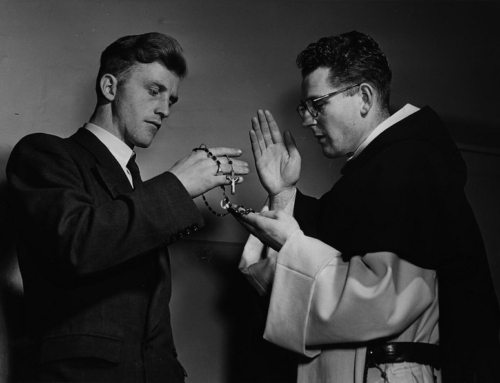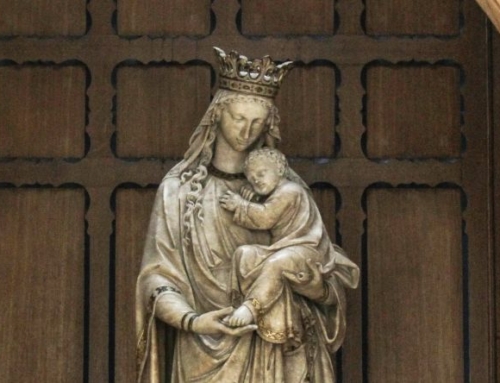Music and the Transformation of the Heart
Liturgical music is a controversial topic. Within the last century, many have questioned the role of liturgical music, debated its style, and challenged its purpose. Amidst the confusion of the ongoing discussion, a central point has been all but forgotten: Music moves us, and when used in prayer, it moves our hearts to God. This essay will explore this reality by looking at the place of music within the life of the Dominican friar. Specifically, we will look at the importance of the heart in monasticism, the effects of music on the heart, and the way music is used liturgically by the friars.
There has been a connection between the Dominican friars and music since the founding of the Order of Preachers. We need only look at the example of St. Dominic, who would sing the praises of God both in the chapel and on the road. “He would then walk around on each side of the choir,” it is reported, “exhorting the brethren by his words and example to sing well and attentively, and to recite the Psalms devoutly” (The Process of Canonization at Bologna). When traveling, he would keep silence except for moments when he would chant hymns, such as the Ave Maris Stella or the Veni Creator Spiritus. “As he neared a place in which he suspected traps had been laid for him,” reports Bl. Jordan of Saxony, “he started to sing and walked by fearlessly. When the heretics learned of this, they marvelled at his courage” (The Libellus, 34). Listening to others chant the praise of God often brought him to tears. Following Dominic’s example, this love for singing has been an important characteristic of Dominican life.
The Heart
In order to understand music’s effect on the human heart, we must first have a basic understanding of what is meant by heart. God created man in his image, forming him from the dust of the earth and breathing “into his nostrils the breath of life” (Gen 2:7), bringing him to life. God did not breathe life into any other creature in such a way, and no other creature on Earth possesses the depth of heart and capacity for goodness as man. This sweet, powerful, and divine breath stirred within the body of dust a profound desire for goodness, that is, the fulfillment of the heart’s desires and accompanying happiness. The desire of the human heart for happiness seems to be insatiable. Every movement in the heart, whether the feeling of hope or fear, joy or sorrow, is rooted in our desire for goodness.
Therefore, when God calls out to our hearts, he is calling to the center of our existence and rousing the desires that he himself breathed into us. “Behold, I will allure her,” he says, “and bring her into the wilderness, and speak tenderly to her” (Hos 2:14). When he speaks thus to us, he speaks to our hearts, the core of who we are. His word stirs our inner lives into movement, recognizing him as the fulfillment of our desires. He reveals to us his infinite goodness and offers to fulfill our desires and satiate our hearts by breathing into us his own Spirit. The beauty and power of the Christian life is this redemption of fallen man by the breathing of the Holy Spirit into our hearts, orienting us back to God as the goodness for which our hearts yearn.
This understanding of the spiritual life forms the foundation of monasticism. The monk enters into the spiritual life with a courageous and vigorous ardor in response to this call within his heart. His goal is to have a heart totally fixated on God and transformed into the heart of Christ by the Holy Spirit. “The end of our profession indeed,” writes the ascetic John Cassian, “is the kingdom of God or the kingdom of heaven: but the immediate aim or goal, is purity of heart, without which no one can gain that end” (Conferences, I, emphasis added). The religious lives a life set apart to train these movements of the heart in the ways of holiness, leaving the world in order to focus his attention and energy on God alone. “I forget what is behind,” Cassian continues, “and I strive to attain to the end, which is the heavenly prize. Whatever therefore can direct us to this goal, which is purity of heart, is to be pursued with all our strength” (Conferences, I). Knowing that the world is full of distractions, the monk limits his surroundings so that his heart is not drawn by anything but the voice of God. In this way, he enters into a dialogue with God and allows his heart to be transformed and filled with the divine goodness. The monk gives his heart, his inner life, over to the fire of the Spirit, that he might be filled with his grace and become fire himself.
While he lives within this paradigm of monasticism in the cloister, the Dominican has the added element of returning to the world to proclaim the Gospel as one who has been personally loved by God and touched in the very core of his being. His heart has been set aflame. By becoming the transforming fire himself, he sets the world ablaze as a hound of the Lord through his preaching and witness to the love of God.
The Effect of Singing
Singing is a natural aid in orienting the movements of the heart toward God. Cassian explicitly connects singing to the movements of the heart, saying that “the frequent singing of psalms is used, that thence constant feelings of compunction may be provided” (Conferences, I). Later, he elaborates on this connection by placing the effects of singing on the heart in the realm of prayer:
He [the monk] will take in to himself all the thoughts of the psalms and will begin to sing them in such a way that he will utter them with the deepest emotion of heart not as if they were the compositions of the psalmist, but rather as if they were his own utterances and his very own prayer; and will certainly take them as aimed at himself, and will recognize that their words were not only fulfilled formerly by or in the person of the prophet, but that they are fulfilled and carried out daily in his own case. (Conferences, X)
Singing incorporates the movements of the heart with what is known and proclaimed to be true in prayer; it brings an emotional dimension to prayer. This profound insight of the earliest monks has influenced monasticism and religious life to the present day. The tradition of the Church’s chant was fostered, formed, and recorded by those who lived inside cloisters for the sake of orienting the heart in prayer. As Dominicans inheriting the monastic tradition, we take singing as an integral and important aspect of our lives, for it has profound effects on the heart and is useful for purifying our hearts of all distraction.
Plato, among others, understands music to derive this power from its imitation of the emotions and feelings of the heart, along with its ability to reproduce them in the hearts of the listeners. Plato speaks of this at length throughout his works, but his words in the Republic sum up his position succinctly: “Rhythm and harmony most of all insinuate themselves into the inmost part of the soul and most vigorously lay hold of it in bringing grace with them.” He goes on to say that music teaches one to delight in things that are good, becoming “established as habits and nature, in body and sounds and in thought” (Republic, III). Aristotle built on this understanding by saying that our hearts move in sympathy with the imitations of emotions heard in music: “Rhythm and melody supply imitations of anger and gentleness, and also of courage and temperance . . . and of the other qualities of character . . . for in listening to such strains our souls undergo a change” (Politics, VIII). Agreeing with Plato, he says that our inner character is formed by imitation of the music we hear. He goes so far as to compare music to gymnastics, for just as gymnastics trains the character of the body, music trains the character of the heart.
While the ancient philosophers speak of the effects of music on the heart, the Scriptures, in turn, speak of singing as the outpouring of the heart before God. When the Israelites were saved from the Egyptians after God swallowed their enemies in the Red Sea, they responded with a song of praise: “I will sing to the Lord, for he has triumphed gloriously; the horse and his rider he has thrown into the sea” (Ex 15:1). The just are repeatedly encouraged to sing psalms as an act of praise and thanksgiving for the goodness God has shown to his people. St. Paul exhorts the Ephesians to offer songs of praise to the Lord: “be filled with the Spirit, addressing one another in psalms and hymns and spiritual songs, singing and making melody to the Lord with all your heart” (Eph 5:19). When St. John is given a vision of heaven, he finds the saints adoring the Lord and casting their golden crowns before his throne while singing of his glory (Rev 4:10–11). Not only is music a means to teach the soul how to feel, as the ancients describe, but the love of Jesus Christ so fills the heart that the outpouring of the heart before him through song is the most appropriate response. Singing has a twofold role: It not only moves, but also manifests the emotions of the heart.
Dominican Singing
In his rule, St. Augustine tells the brethren: “When you pray to God with psalms and hymns, the words you sing should be alive in your hearts” (The Rule of Saint Augustine). The friars are reminded in the very rule they profess that the singing they do in the choir has a direct influence on the movements of the heart. Saint Thomas Aquinas comments on this influence in words similar to those of Cassian, saying that “the use of music in the divine praises is a salutary institution, that the souls of the faint-hearted may be the more incited to devotion” (Summa Theologiae II-II, q. 91, a. 2). In this final section of the essay, I will consider how the twofold role of music appears in the spiritual life of the friars: It is for us a teacher and a manifestation of love.
First, liturgical music teaches the friar how to pray like a Dominican by uniting his heart to those of friars throughout the centuries. The expression of emotion by Dominican friars in prayer has shaped the chants we sing today, bequeathing us a treasury of distinctly Dominican chant. For instance, the Dominican Salve Regina has nuances that make it distinct from every other setting of the same text, causing the heart to move in different ways at various points within the chant. These are the movements of the Dominican heart as it honors the Blessed Mother. Also, the antiphons to St. Dominic are not only manifestations of affection but engage the friars in a common feeling of devotion to their father. The O Spem, for example, conveys a feeling of hope and supplication, while the O Lumen proclaims the virtues of St. Dominic and stirs the heart to thanksgiving and wonder. As a final example, the Missa Lux et Origo, a Dominican Mass setting for Easter, does not possess the triumphalist feeling one would expect for Easter Sunday but is soothing and meditative, like a breath of fresh air or a sigh of relief; it is a feeling of satisfaction and peaceful thanksgiving after three days of complex liturgies and solemn celebrations. The chants of the order aid the friar in moving his heart, forming his emotional responses while the words engage his intellect. Dominican chant teaches the friar to pray like a Dominican.
This teaching does not reach the friar when he is alone, but when he is at choir with his brothers. In this way, singing becomes also a unitive force within community life, helping us to pray with “one heart and one soul seeking God” (The Rule of Saint Augustine). Everything employed for the sake of singing, such as the accompaniment of the organ or cohesive breathing during the psalms, are all meant to aid the community in giving heartfelt praise to God with one heart and one voice. At the same time, this ideal requires the friar to enter into something greater than himself and his own comfort. If we are to become one in praise, we must listen to the brothers; the individual friar must join in the common voice of the entire community. Singing the psalms demands humility of heart, but through this communal action the heart becomes a Dominican heart, singing in unison with the brethren for the greater glory of God. The music of the choir is not meant to entertain us or make us feel good about ourselves. Rather, we purify our hearts together in our common song of praise, stretching through the centuries of Dominican tradition.
Second, singing is a means by which the friar pours out his heart before God. Just as the Israelites broke out in song after beholding the glory of God in the defeat of the Egyptians, the friar sings out as one who takes up each day the struggle against his own weakness and lives a life within the grace of God. Like the saints whom John beholds singing the praises of God around the throne of grace, the friar throws down his own pride as he encounters God in a profound way as he studies and prays. He is listening for the voice of God and allowing God to transform his heart for his salvation and the salvation of others. When he feels the movements of his heart toward God and experiences the grace of God working in his life, the friar is compelled to manifest the emotions of the heart, and singing is the most natural and fulfilling way that this is done. The choir, then, becomes a world unto itself, stirring up a passion that is diffused throughout the world through the ministry and preaching of the sons of St. Dominic.
*****
This image of the friar in prayer can show the power that music can have in the liturgical life of every person, especially at Mass. God calls to all of us in the deep recesses of our hearts, desiring to fill us with his own goodness and satisfy the desires of our hearts. In the words of St. Augustine, “The thought of you stirs him so deeply that he cannot be content unless he praises you, because you have made us for yourself and our hearts find no peace until they rest in you” (Confessions, I.i.1). Singing helps to keep our hearts fixed on God, desiring him as the one and true good that brings peace to our hearts.
✠
Download a PDF of this article here



